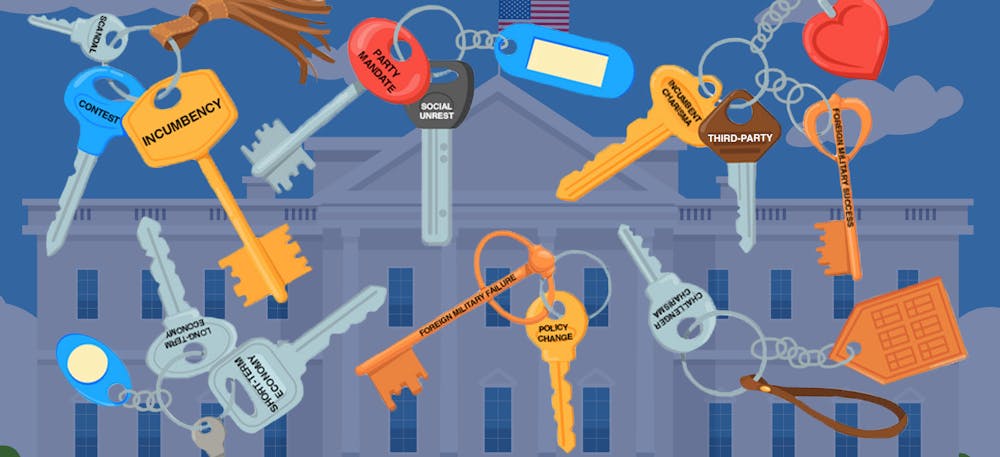As the 2024 presidential election looms, Americans nationwide are struggling to decide who to vote for. Allan Lichtman, a distinguished professor of history in the College of Arts and Sciences, has a solution — one that hasn’t failed in 42 years.
“I’d love to tell you I came up with my keys by deep and long contemplation,” Lichtman said. “But if I were to tell you that, to quote the late, not so great, Richard Nixon, that would be wrong.”
Lichtman’s 13 keys to the White House are an index of true and false responses to a set of questions, where “true” favors the re-election of the incumbent president and “false” favors the challenger. They include:
Party mandate: The incumbent party holds more seats in the U.S. House of Representatives than it did after previous midterm elections.
Contest: The candidate is nominated on the first ballot and wins at least two-thirds of the delegates.
Incumbency: The current president is the party candidate.
Third-party: There is no significant search party or independent campaign.
Short-term economy: The National Bureau of Economic Research has either not declared a recession, or has declared it over prior to the election.
Long-term economy: Real per-capita economic growth during the term equals or exceeds the mean growth during the previous two terms.
Policy change: The administration achieves a major policy change during the term, comparable to the New Deal.
Social unrest: No social unrest during the term that is comparable to post-Civil War Reconstruction, or raises deep concerns about the unraveling of society.
Scandal: No broad recognition of a scandal that directly involves the president.
Foreign or military failure: No failure during the term that appears to significantly undermine America's national interests or threaten its standing in the world.
Foreign or military success: Major success during the term that significantly advances the United States’ national interests or its standing in the world.
Incumbent charisma: The incumbent party candidate is a national hero or an inspirational candidate.
Challenger charisma: The challenger party candidate is not a national hero or an inspirational candidate.
When six or more of these statements are false, the incumbent candidate is predicted to lose.
Lichtman came up with his keys in 1981 “totally by accident.” While a visiting scholar at the California Institute of Technology, Lichtman met Vladimir Keilis-Borock, who was the world’s leading authority in earthquake prediction.
Together, the two became the “odd couple of political research” and worked to turn Keilis-Borock’s methods of predicting earthquakes to work for political elections.
“We looked at using the methods of earthquake prediction, pattern recognition, recognizing patterns, in our case in the political environment, what patterns were associated with stability,” Lichtman said. “The pattern recognition methodology gave us the 13 keys that gauge the incumbent party’s strength and performance and a simple decision rule.”
The keys themselves are unweighted, meaning that no key is more important than another. To be weighted, they would have to be based on past elections and so weights could change unpredictably. The keys also have an internal correction method called a trigger effect, where if one key becomes important enough, it will trigger other keys.
According to Lichtman, candidates would be better off designing their campaigns around the keys as opposed to traditional campaigning, which is “useless and counterproductive.”
“No one cares what you say in a traditional campaign. Who remembers what Hillary Clinton or Mitt Romney or John McCain or John Kerry or Walter Mondale or Bob Dole ever said? Nobody does,” Lichtman said. “But if you want to campaign by the keys, you campaign according to your vision, you campaign according to substance. Won’t change the keys, won’t change whether you win or lose. But if you win, you will have built a mandate for governing which will help your party to win the next election.”
Following his accurate prediction of former President Donald Trump’s 2016 win, Lichtman received a note reading “Professor, congrats, good call” in large letters with Trump’s signature. Lichtman said he did not receive one from President Joe Biden following his win in 2020.
Although Lichtman won’t have his 2024 prediction solidified until early August, he said that for Biden to lose “a lot of things would have to go wrong.”
Despite his long career as a political forecaster, Lichtman makes clear that his predictions are just that; predictions, not endorsements.
“I'll also tell you the key to being a successful forecaster. It’s not knowing history, they gotta know history. It’s not knowing politics, although you gotta know politics. It’s not knowing math, although you gotta know math,” Lichtman said. “The most important thing is keeping your own personal views out of it. If I let my personal views influence my predictions, I’d be wrong half the time, I’d be useless.”
Correction: A previous version of this article misrepresented one of the 13 keys. The article has since been updated to reflect the proper meaning of the third party key to clarify there will not be a third party candidate.
This article was edited by Samantha Skolnick, Abigail Turner and Abigail Pritchard. Copy editing done by Luna Jinks, Isabelle Kravis and Ariana Kavoossi.





